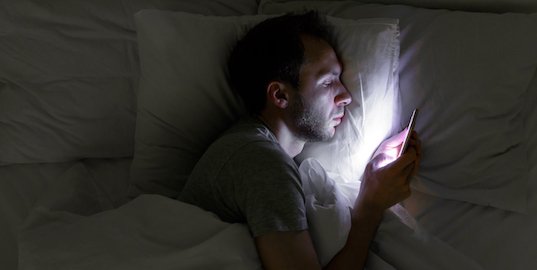How to Sleep Better with Tech Tweaks
Your sleep habits can have a lasting effect on your overall health. Simply tweaking a few of your tech device habits can help upgrade your sleep hygiene for a better night’s rest.
Why am I so tired?
Do you wake up happy to face the day or exhausted before you even get started? According to the CDC, one in three US adults get less than the recommended amount of sleep![1]
Quick question: how much sleep do you really get most nights?
According to the experts, you need seven hours or more every night.[2] How do you compare?
Why does sleep matter so much for health and wellbeing?
1. So you can be more productive:
From a productivity perspective, missing out on your zzz’s is not good.3 Ariana Huffington, who used to routinely work crazy hours but is now leading the sleep revolution, says, “The irony is that a lot of people forego sleep in the name of productivity. But in fact our productivity is reduced substantially when we’re sleep deprived.”
2. So you’re not walking around “drunk”:
Not getting enough sleep can impair your abilities similar to being drunk![4] “We would never say, 'This person is a great worker! He's drunk all the time!' yet we continue to celebrate people who sacrifice sleep for work,” says Charles Czeisler, a Professor of Sleep Medicine at Harvard Medical School.
3. So you stay healthy:
Bad sleep habits can increase your calorie intake and may impact your risk of high blood pressure, type 2 diabetes, heart disease and stroke.5 And guess what? Healthy sleep habits can lower psychological strain, give you better self-control, and replenish self-regulatory energy.6 Pretty intense, huh?!
Tech Tweaks to Improve Your Sleep Hygiene
To keep it simple, we’re going to focus on how you can tweak your tech habits to get better sleep.
Quick questions:
Have you fallen asleep with your phone in your hand? Yes/No
Do you reach for your phone the moment you wake up? Yes/No
Do you check work email outside of work hours? Yes/No
Have you woken up to check a notification? Yes/No
How’d you do?
Ok, so you’re convinced, great! Let’s make this sleep thing a priority and get you to sleep!
Here are some tiny tweaks you can try:
Move it.
Charge your device overnight somewhere other than next to your bed. Keep it farther away, or better yet, in another room. You’ll survive the separation, we promise!
Dim it.
Staring into the bright light of your phone may mess with your Circadian rhythm and your melatonin production. Using a red filter app may help reduce your exposure.
Set it.
Set an alarm to go to bed. Alarms don’t have to be just for waking up. Use one to remind you that it’s time to wrap it up for the night.
Lock it.
Is the temptation just too strong to keep scrolling through cat videos? Use an app blocking app that makes it impossible for you to fall into the bleary-eyed scroll trap after a certain hour.
Block it.
Do you check notifications when your phone buzzes at night? Use the “do not disturb” function to block all notifications during sleep hours.
Pick a tweak and do it now so you can get your 7-9 hours tonight. Let’s do this, and be Healthy For Good!
Sleep and Sleep Disorders, Centers for Disease Control and Prevention, 2017 https://www.cdc.gov/sleep/index.html
Seven or more hours of sleep per night: A health necessity for adults, American Academy of Sleep Medicine, 2015 http://www.aasmnet.org/articles.aspx?id=5596
Association Between Sleep and Productivity Loss Among 598 676 Employees From Multiple Industries, American Journal of Health Promotion, 2017 https://www.ncbi.nlm.nih.gov/pubmed/28823195
Acute Sleep Deprivation and Risk of Motor Vehicle Crash Involvement, AAA Foundation for Traffic Safety, 2016 http://newsroom.aaa.com/download/9799/
Sleep Duration and Quality: Impact on Lifestyle Behaviors and Cardiometabolic Health, A Scientific Statement from the American Heart Association, 2016 http://circ.ahajournals.org/content/134/18/e367
Interactions between sleep habits and self-control, Frontiers in Human Neuroscience, 2015 https://www.ncbi.nlm.nih.gov/pmc/articles/PMC4426706/
This article appeared in American Heart Association and has been published here with permission.

